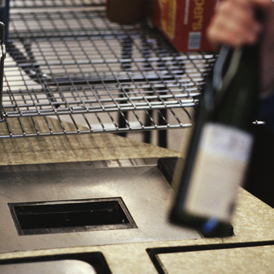Alcohol abuse – a scandal that’s proving hard to tackle
As David Cameron calls alcohol abuse the scandal of our society, Alcohol Concern tells Channel 4 News minimum pricing would save lives, but the industry claims it would not work.

As part of plans to tackle alcohol abuse, the Prime Minister is thought to be supportive of the idea of introducing a minimum price per unit for alcohol, but the idea is opposed by the drinks industry who argue it is not only an ineffective solution, but probably illegal under EU law.
All eyes are currently on Scotland, where the SNP came into power last May with a promise to introduce a minimum price for alcohol. If they can succeed in getting the bill through Parliament, Scotland will be the first country in the world with a minimum price per unit of alcohol.
The Scottish health secretary Nicola Sturgeon recently visited Brussels to hold talks on the issues with EU health commissioner John Dalli. Her spokesman said afterwards: “The very clear message from the commission was confirmation that minimum pricing for alcohol is entirely compatible in principle with EU law.”
But confusion has followed this statement. Last week the European Commission said that the plan “seems, in principle to be ‘notifiable’ under EU free trade law, meaning it needs to be sent to the Commission for legal judgement.
“We don’t believe it will tackle alcohol misuse” Gavin Partington, the Wine and Spirit Trade Association
Gavin Partington is spokesman for the Wine and Spirit Trade Association (WSTA). He told Channel 4 News that legal advice seems to suggest it would not be possible to pass the law: “The Scottish government claims it is potentially legal because it is justifiable under health grounds but they haven’t specified what those grounds would be. It’s clear from legal opinion that minimum pricing would be illegal under EU law.”
But he says that legality is not the main reason why the industry opposes minimum pricing: “Our more fundamental objection is that we don’t believe there is any evidence to show that it will tackle alcohol misuse. The evidence is that the people who misuse a product are the very ones least likely to be hit by it.
“The research suggests that in the first year of a price rise consumption would fall by 6 per cent and there would be 60 less deaths. But in 2009-2010, consumption fell but alcohol related deaths are rising.”
The Scottish solution
The SNP came to power last May on the back of a firm promise to tackle the alcohol problem that blights the country. They estimate that Scotland’s alcohol problems cost £2.56bn each year – £900 for every adult.
Last week SNP Health Secretary Nicola Sturgeon said: “There is a clear link between the price of alcohol and consumption levels which is why we have always made the case for the introduction of a minimum price.”
The model of what impact a pricing law might have has come from research by the University of Sheffield in 2008 that used 45p per unit as a model.
The report suggests that overall weekly consumption would fall by 6%, alcohol related deaths would fall by about 60 in the first year, rising year on year.
Addressing the issue of how a price rise would hit ‘normal’ drinkers it said that harmful drinkers would pay an extra £132 a year, compared to just £9 for moderate drinkers. It also cited a fall in crime and fewer workdays lost through absenteeism
Gavin Partington says that a better policy would be to target problem drinkers, rather than all drinkers: “A minimum price of 50p per unit would put up the price of many bottles of wine, vast numbers of bottles cost under £5.00.
Emily Robinson is Director of Campaigns at Alcohol Concern. She disagrees that the policy would penalise everyone indiscriminately. She told Channel 4 News: “The interesting thing is that it helps two groups – young people who drink cheap drinks and hardened drinkers.
“With a minimum price of 50p per unit the average bottle of wine would be £4.50 and most are at that price already. Minimum pricing affects supermarket pricing rather than pubs and clubs. There are strong ciders being sold for very low prices per unit – as low as 12p, so it’s a big hike. People’s lives will be saved.”
Can ‘Responsible drinking’ campaign work?
So what are the alternatives? The industry want what they say is a more focused approach – targeting only those who are problem drinkers. Gavin Partington says education and enforcement are a better way forward: “The policy should be focused on enforcing the law so that 18-24 year olds who are drinking to excess or ending up in hospital are prosecuted under anti-social behaviour laws.
“And the second thing is education. We have never really had a proper education in a sufficiently early stage in people’s lives.”
Last year six major health organisations refused to back the government’s public health responsibility deal, saying ministers were allowing the drinks industry to dictate health policy. Under the deal, drinks producers and retailers pledge to provide clear unit labelling and support responsible drinking.
Emily Robinson says the scheme wasn’t working: “We left the responsibility deal because it was dominated by the drinks industry and we feel they have a vested interest. It’s been going for a year and people are asking how effective it’s been – we really need concrete strategies.”
-
Latest news
-
Year of civil war in Sudan ‘a nightmare of hunger and displacement’4m

-
Israel fears repeat Iran attack, says former editor of Jerusalem Post4m

-
How long could it take to clear the Rwanda asylum seeker backlog?3m

-
Rwanda asylum boost for Sunak as bill expected to become law2m

-
Donald Trump trial: day one of historic Stormy Daniels court case4m

-




